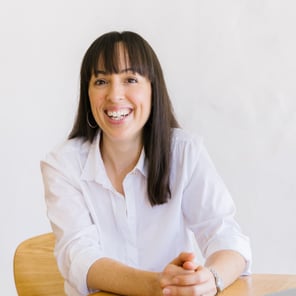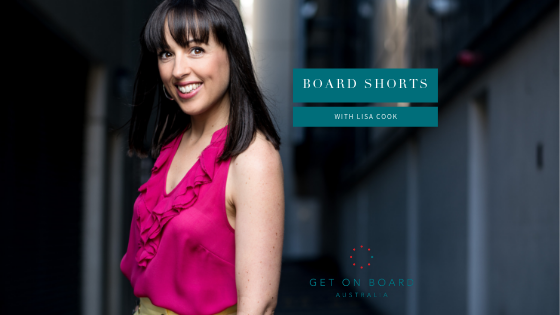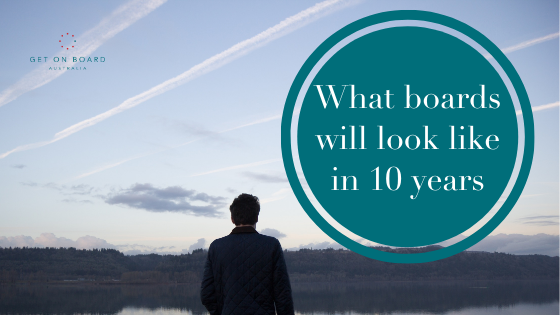Get to know the founder of Get On Board Australia, Lisa Cook
Today, BoardPro is glad to introduce Lisa Cook, Get On Board Australia's founder and managing director. Get On Board Australia aims to educate and support company directors in their professional journey, advocating for ease of access to the industry and increased diversity in the workplace. The company offers resources aimed at jumpstarting the career of aspiring directors, helping them to develop strategies in key areas of governance, business and finance, including flexible programs and pricing for professional development across the public, private, NFP sectors and beyond. Cook is a fierce advocate for people accessing and thriving on Boards. With a strong background serving on Boards, Cook works passionately to help train new leaders to excel in the Boardroom and enrich their communities.
Cook is a fierce advocate for people accessing and thriving on Boards. With a strong background serving on Boards, Cook works passionately to help train new leaders to excel in the Boardroom and enrich their communities.
She is the former non-executive director and current governance committee member of Inclusive Sports SA, which provides assistance and support for minority groups accessing sports. Cook also served as the chair of the City of Charles Sturt's Western Business Leaders Executive group, working in close collaboration with the Council on economic development in the Western Adelaide region and the business needs of the WBL. Additionally, she is the host of the Board Shorts Podcast.

BoardPro reached out to Cook to discuss how Boards and CEOs can increase diversity within their organisations. Specifically, we were interested in age dynamics within the governance sector, the hurdles faced by those just starting out in the industry and how the business world has evolved in recent years.
Cook's professional experience, combined with her enthusiasm for building community and encouraging the growth of future Board leaders, made her the perfect person to speak to about this timely topic.
Q: How can Boards work to increase and support diversity in the workplace? What approaches should they take, and how do these vary (if at all) across industries?
Truly make it a strategic imperative with the requisite resources and approach to make it happen and add value to the whole organisation. Focus on inclusion as much as creating diversity; there is a significant difference between the two and they both can work to reinforce the other. Know that the board cannot have all of the viewpoints of diversity, so bring in the necessary support and information from those who have. That way you increase your chances of a successful approach to diversity and inclusion, and it moves beyond tokenistic, superficial PR campaigns.
Q: What top skill would you recommend for aspiring Board directors? What is the most common challenge you see company directors overcome in training?
The top skills I encourage aspiring board members to develop are curiosity and courage. They both work hand-in-hand and reinforce each other. You must be both curious and courageous to probe, seek out further information, and appropriately challenge others (and sometimes your own) thinking.
On a related point, I've witnessed board members - both new and existing - gaining knowledge through training and education, empowering them to have the confidence and courage to speak up, ask questions, and challenge if needed. Knowledge is confidence.
Q: What is something unexpected about the governance sector that those new to the industry should be aware of?
There are many ways to “good governance” and it looks and functions differently in each organisation, at each point in time, and with each board iteration. Each board needs to regularly define good governance so that it can be clear on its role and how it can function optimally within this role. Many boards don't recognise this and therefore don't do these activities and will become frustrated with things not being effective and efficient.
Q: Is there a generational divide in the governance sector, and if so, what steps can Boards take to address this?
Board demographics differ greatly between the “top end of town” (for example, ASX-listed boards) and 'grassroots' organisations (for example, NFPs and community groups). I have found that many 'grassroots' boards are more diverse than the 'top end of town'.
Within larger organisations, the demographic divide includes age but also many other factors such as race, economic upbringing, culture, vocation/profession, cognition, and sexual orientation and identification. Although we have made significant gains when it comes to gender balance, what we see are many boards comprised of older white people. The people who are on Boards where diversity is lacking beyond gender must ask themselves what actions they can take to gain broader perspectives through diverse board composition in order for the organisation to sustain and flourish, even if that means stepping aside to enable fresh and different minds in. Start by taking a radically different approach to your board recruitment practices and processes so that you don't end up with the same all the time.
Q: How have you witnessed the governance world change since first starting out in it, and what changes do you anticipate moving forward?
In July 2016, I wrote an article about what boards will look like in the next 10 years (https://getonboardaustralia.com.au/what-boards-will-hopefully-look-like-in-10-years ), and in there, I 'predicted' that boards will be:

- More Diverse (and not just of the gendered type);
- Technologically Savvy (by using Skype and online board management software);
- Geographically Unbounded (accessing skills globally by utilising online tools noted above); and,
- More Sophisticated (facilitated by the ease of access to free and low-cost governance and board education - such as Get on Board Australia and BoardPro's resources).
I think we have seen many of these eventuate - sped up by the COVID-19 pandemic. These will continue, along with the addition of all organisations adopting ESG practices/approaches, recognising the need for organisations to understand their role in being a good corporate citizen and that it is fast becoming an expectation by customers, investors, governments, and other stakeholders.
Q: What steps can company directors take to increase their future-focus and strategies for challenges that may come their way? How can they build contingency plans that protect their long-term goals?
It comes back to a common challenge that many boards have, and that is around time. Great boards are well organised and know what their role is and what it is not so that they are spending time on the things that matter - inside and outside of the Boardroom. The value that Board members bring are their external perspectives and observations, unencumbered by the day-to-day operations of the business. Part of every board member's monthly hours is committed to staying up-to-date and ahead of economic trends and impacts through consuming information, thinking, reflecting, and bringing their perspectives into boardroom discussions.
Q: What is presently missing from the Board world that you would like to see become more prevalent and/or normalised?
True diversity transcends gender. And that it is “activated” to bring value and strategic advantage to a board and its organisation.
Q: As a BoardPro partner, please share why BoardPro's software is such a valuable tool for Boards and organisations
It supports the board to focus their time on the things that truly matter, particularly to my point above, ensuring and enabling time for strategic, future-focused conversations.
Share this
You May Also Like
These Related Stories

The costs of being reactive instead of proactive when it comes to societal issues

The next generation of Board directors is ready


